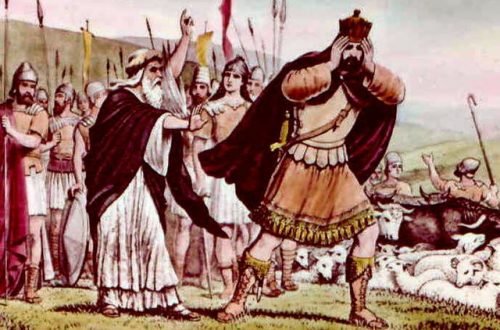Good News – Genesis 27
Background
Background
If you aren’t familiar with the story of Isaac and his sons, Jacob and Esau, you’re missing out on a pretty wild story. Isaac was the son of Abraham who was nearly given as a sacrifice. God instead gave a ram as a substitution symbolizing the Christ. Though Jacob and Esau were fraternal twins, Esau was first born. Isaac loved Esau, but for seemingly superficial reasons. Esau was not only the first born, but he was a big tough hairy manly man who loved to hunt. Jacob was more of a momma’s boy who stayed home most of the time (Gen 25:27-28). Jacob had a couple of things going for him, though. He was smart. He also had the favor of his mother, Rebekah. She was the one who knew God’s plan for him.
The most important factor was Jacob had a heart for God whereas Esau cared about himself. In Gen 25:29-34 Esau had a bad day hunting and was hungry. He sold his birthright to Jacob in exchange for bread and soup.
Gen 27 in a Nutshell
By the start of Gen 27 Isaac’s sight has failed him and he is dying. He knows it is time to bless his son (vv1-2). He decides to bless Esau because, after all, Esau was older (albeit only by minutes) and he was his father’s favorite. There were a couple of problems with Isaac’s plan. For one, Esau already sold his birthright to Jacob. For another, God revealed His plan to bless Jacob to Rebekah. God’s plan would of course trump Isaac’s plan. The part we must come to grips with is the means used by Jacob and Rebekah to get Isaac’s blessing.
Isaac sends Esau to hunt game and bring it back and cook it for his father. Isaac promises to then give him the blessing (vv3-4). Rebekah overhears (v5). She goes and gets Jacob and literally cooks up a scheme to make sure God’s plan is carried out (vv6-10). Though her methods are questionable, she clearly intends to do God’s will. Jacob at first balks at this. Jacob doesn’t have a moral problem with fooling his father, instead his problem is practical – he is smooth and Esau is hairy (v11). He fears the blessing will become a curse (v12). His mother’s faith is strong, however, and she says she’ll accept the risk (v13).
Jacob obeys his mother and does all she instructs (vv14-17). He goes to his father, posing as Esau, and receives the blessing. In the process Isaac at first doubts his identity, but with fake hair on his arms and Esau’s clothes for smell, Jacob pulls it off (vv18-29).
As soon as Jacob gets the blessing and goes out, the real Esau shows up with his meal (vv30-31). This upsets Isaac, but after Isaac and Esau figure it out he says the blessing must remain where it is – on Jacob (vv32-33). Esau pleads for a blessing, but the blessing Isaac offers is substantially inferior to Jacob’s blessing (vv34-40). Esau is jealous and plots to kill his brother over the deception, but again Rebekah intervenes to protect her beloved younger son by sending him away for a time (vv41-45). On top of all this Rebekah is worried about what kind of wife Jacob will take. She has enough problems with her other daughters-in-law by Esau (v46).
The Good News of Gen 27
Gen 27:13 His mother said to him, “Let your curse be on me, my son; only obey my voice, and go, bring them to me.” When I look at Rebekah, I see a foreshadow of Mary. She knows God’s will and is willing to accept the consequences for her obedience. Mary was told what would happen, too. She also decided to obey God without argument in spite of earthly reprisal. Rebekah must send her son away for his safety. Mary takes Jesus to Egypt for a while. Rebekah’s chosen son would be the heir God intended to use to bless the world. Mary’s son would carry out that very blessing. Rebekah’s other son would be put in submission to Jacob. Mary’s other sons would likewise serve the chosen son, Jesus. Mary was blessed, but she also suffered – watching the cruel torture and death of her son. Rebekah’s consequence was to have to see her son sent away and suffer the hardships of dealing with daughters-in-law she hated for the sake of Jacob’s well being. Rebekah and Mary were both blessed by God, but also both suffered greatly in this life for their obedience.
If not for the obedience of Rebekah, Jacob would not have received the blessing. Jacob’s blessing reads as follows:
Gen 27:28-29 May God give you of the dew of heaven
and of the fatness of the earth
and plenty of grain and wine.
Let peoples serve you,
and nations bow down to you.
Be lord over your brothers,
and may your mother’s sons bow down to you.
Cursed be everyone who curses you,
and blessed be everyone who blesses you!”
The offspring of Abraham who would save the world was of course Jesus. We all become offspring by spiritually becoming joined to Christ through the Holy Spirit. As Jesus inherits eternal life, so shall we by being spiritually joined to him through the gift of the Spirit (Rom 8:14-17). The promise to the earthly house of Israel included dew of heaven, fat of earth, and plenty of food. It foreshadows the new covenant (Jer 31:31-34): having the law written on and the Spirit residing in our hearts with hope for eternal life without fear or sadness or pain (Is 65, Rev 22). The rest of Jacob’s blessing likewise foreshadows even greater blessings. Nations would bow down to Israel, which they certainly did. One day every knee will bow to Christ (Is 45:23/Phil 2:10). Just as Jacob was put over Esau, so Jesus was made Lord of all (Mt 21:41-45). Finally, Isaac passes along a blessing which is a form of the “golden rule,” but with the promise God will enforce it. This last two lines are perhaps the best summary of the choice we all must make when face to face with the reality of God. We can curse Him or bless Him. We will reap what we sow. What will you sow?


